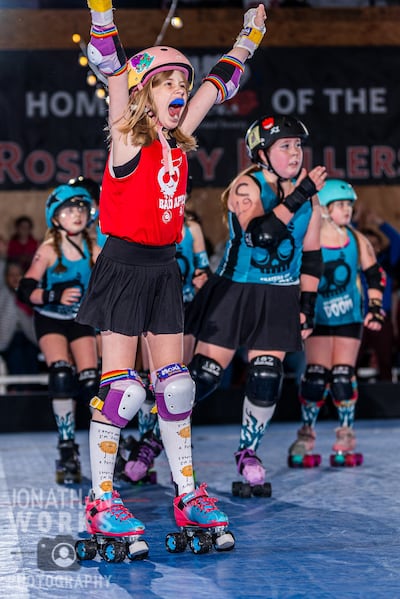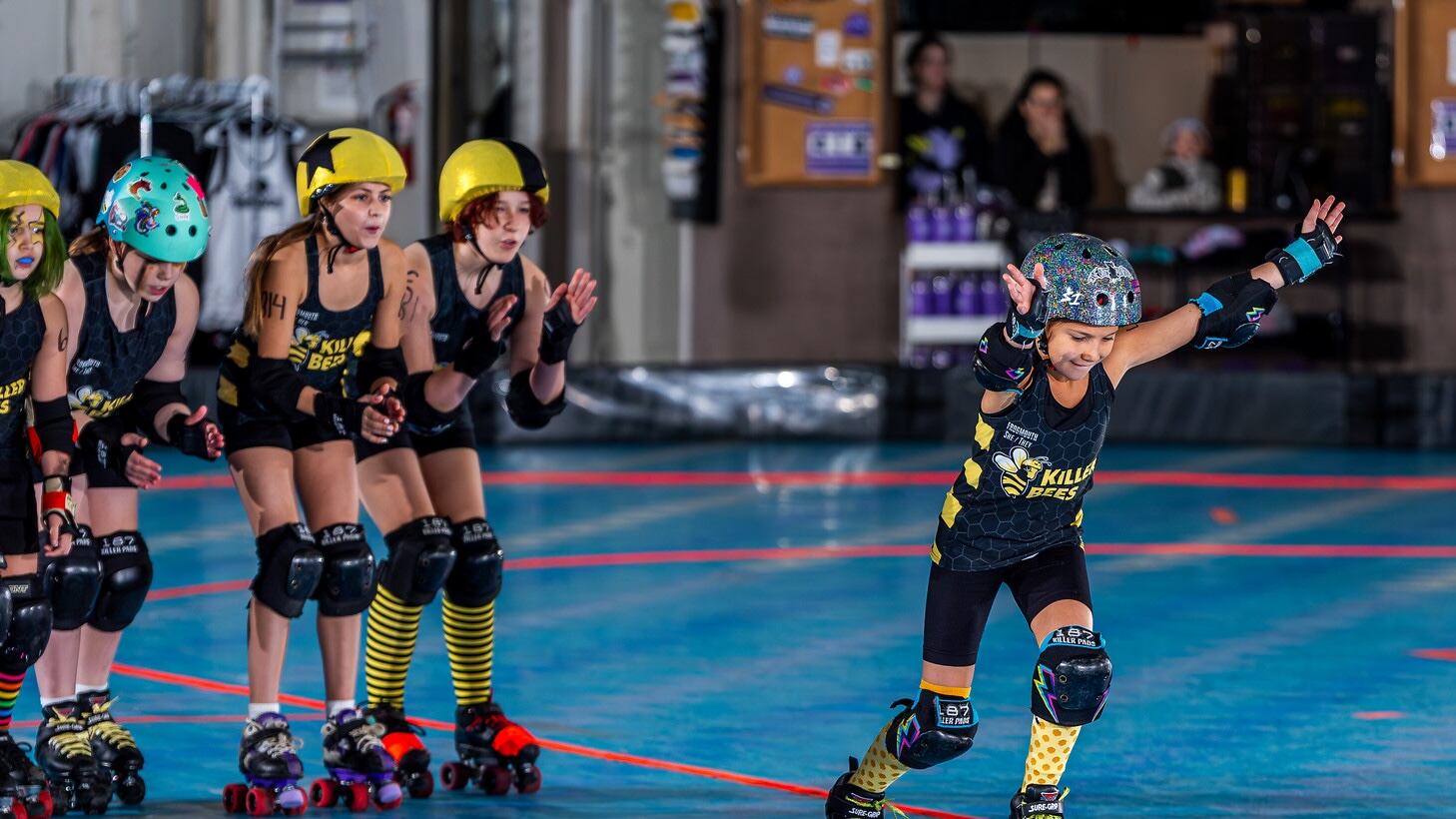For parents and kids who want to immerse themselves wholeheartedly in what might be considered Portland’s favorite indie sport, Rose City Rollers’ Junior Roller Derby Summer Camp would like to enter the chat.
“The most common thing I hear from parents is, ‘We tried everything, and this is the one thing that really stuck,’” says Jymn Heathcott, aka Coach Monkey, junior program coordinator for Portland’s Rose City Rollers. “They’re so happy that their kid has found their people.”
Women and girls ages 7 to 17 enrolled with Rose City Rollers (the Women’s Flat Track Derby Association uses “women” to refer to all women, including trans, cis, intersex and gender-expansive women) experience more than the unwavering support of a city in love with alternative sports. At the weeklong summer camp, taught at beginner, intermediate and advanced levels, skaters spend part of their day on skates learning derby skills and strategy, and part of the day doing off-skates activities like arts and crafts. Campers who excel in the rink are encouraged to pursue junior team membership, which could ostensibly lead to spots on any of the seven junior teams and eventually a spot on the all-star team. Junior skaters and campers are divided by age: the Rosebuds (ages 12 to 18) or the Rose Petals (ages 7 to 12). Established in 2009, the junior program and its associated summer camps play both modified and low-contact roller derby, welcoming players of all skill levels into one of Portland’s most supportive junior sports communities.
Perhaps it’s because junior roller derby differs so greatly from conventional sports (Heathcott jokes, “When people come to see roller derby for the first time, they’re like, where’s the ball?”) that they’ve cultivated such a passionate community of supportive parents and fans. And it’s not just roller derby adults who make up this network of enthusiastic volunteers.
“It’s mostly kids coming into the sport and the league on their own,” Heathcott says. “Roller derby is a legitimate, rapidly growing sport with world-class athletes executing athleticism like you’ve never seen before. Some people might not realize that.”
Community is baked into the Rose City Rollers junior program, with team membership being the aspiration of most campers. “We are 100% volunteer-run,” Heathcott says. “Families volunteer at least two hours a month, but oftentimes parents go above and beyond those two hours. If it weren’t for the volunteers, we wouldn’t be the league that we are, especially the junior program.”

The volunteers Heathcott refers to do everything: run events and bouts, livestream, work the door, staff merch booths, and even sit with newcomers in the audience to explain what’s happening on the track.
“People will host pre-bout dinners at their houses,” he says. “This year they seem to love going to the Goodwill bins as a team bonding event. They go on hikes together on weekends. One of the teams even has an annual event where they decorate their denim vests as part of their team image.”
Camaraderie aside, Heathcott says the sisterhood is just one of the many benefits of league involvement. “A huge thing these kids get out of playing roller derby is structure. We’re a league of 400-plus members,” he says. “It’s a pretty even split between adults and juniors, and we have a training program. We’re not just grabbing kids, throwing gear at them, and throwing them into gameplay situations.”
“They go through a whole tiered training process,” Heathcott continues, “to make sure not only that they’re safe but that the people they’re playing with are safe.”
The junior training program feeds skaters directly into potential team memberships (the season runs from January to July and then reconvenes in October in preparation for the next season), but not before they’ve mastered the art of roller derby. This ensures that young derby enthusiasts learn the complexities of the sport as well as the teamwork, trust, relationship-building and empowerment necessary to succeed on the track. Once skaters build up enough skill to make a team, they may even be recruited for an all-star travel team and perhaps, Heathcott says, in time, see themselves on sports TV.
“We just signed a deal with the All Women’s Sports Network to have our games broadcast on Pluto TV and Amazon,” he says, “so not only is this massive for our athletes and league but this is going to elevate the sport to a whole new level.”
“I well up with emotion the more I talk about it—the impact it’s had not only on my skaters and my families but on all the other skaters and families in our community,” Heathcott says. “The benefit of having a league like this is that, yes, kids learn about self-sufficiency but also that parents find the sense of community they couldn’t find with other sports.”
GET INVOLVED: rosecityrollers.com.

